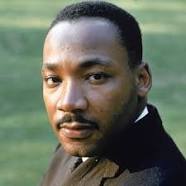Rev. Dr. Martin Luther King’s Legacy
 God calls us to be stewards not only of our personal relationships, but also of our communities, which ultimately can affect justice on a national, even world-wide, scale. In these turbulent political days, I am grateful for people who speak up publicly in a variety of ways, because of their faith.
God calls us to be stewards not only of our personal relationships, but also of our communities, which ultimately can affect justice on a national, even world-wide, scale. In these turbulent political days, I am grateful for people who speak up publicly in a variety of ways, because of their faith.
Today is the day most of the United States celebrates the life and legacy of Rev. Dr. Martin Luther King, Jr. During his years in national headlines, he was known as a civil rights activist, and winner of the Nobel Peace Prize. But he was also a major Christian witness, motivated to activism by deep spiritual and moral principles.
Dr. King’s conscious conversion to Christ came first at age six, when he followed his sister up the church aisle to the altar. In his book Strength to Love, he wrote that his second conversion came at age 25, receiving a much deeper calling. Then pastor at a Baptist church in Montgomery, Alabama, he had led the Montgomery bus boycott. Death threats to himself and his family followed. One midnight in his kitchen he fell to his knees, confessing loneliness and despair. In those moments he heard a voice say, “Martin, stand up for righteousness; stand up for truth. God will be at your side forever.”
Powered by his faith, Dr. King challenged racially-based acts and policies, and the rest is history. He was jailed twelve times, was watched constantly and discredited by the FBI, outlived one near-death stabbing, and endured two bombings of his home.
“Nonviolence is the answer to the crucial political and moral questions of our time,” he wrote, and then outlined six principles for nonviolent resistance in unjust situations:
- Accept innocent suffering without retaliation,
- Do not resist evil,
- Seek to win the opponent’s friendship, not humiliation,
- Attack the forces of evil, not the persons involved in the action,
- Believe the universe is on the side of justice, and
- Avoid both outer physical violence and internal violence of the spirit.
As we seek to be faithful stewards of justice in our own communities, may we try to hold to these principles, as well.
Your partner in ministry,
Betsy Schwarzentraub


